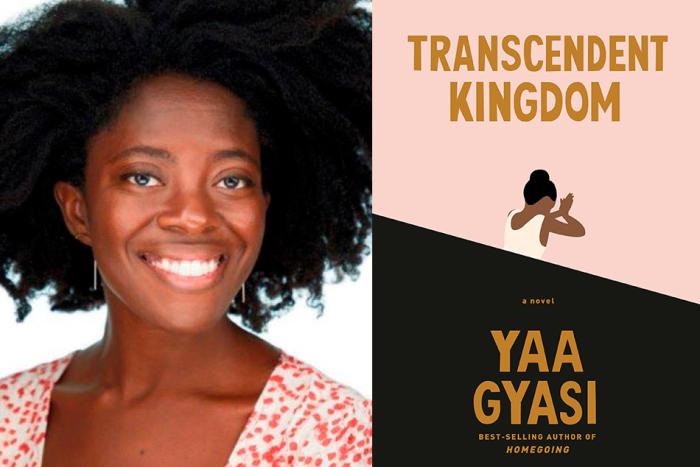I grew up with brown-paper-wrapped packages sent from the Soviet Union by my grandmother. My grandparents were refuseniks—Russian Jews denied visas to leave the Soviet Union. Over the course of our nine-year separation, they sent the contents of their bookshelves, kitchen cupboards and linen closet piecemeal. Every three months or so a package would arrive, decorated with dozens of stamps featuring a man named Lenin or famous cosmonauts, pioneer heroes, hydroelectric plants, Soviet athletes.
These parcels came from people I knew only from photographs. I knew that I was born in a country one could no longer travel to. Even calling involved a multi-day ritual. My mother would send my grandmother a telegram in the middle of the week to suggest a time for a prearranged telephone rendezvous. A telegram would follow in return, the next day. Budu, she would respond—I’ll be there. Laconic, pronoun-less verbs in upper-case transliterated Russian showed up on our doorstep. Then, the following Sunday morning, she and my grandfather would walk the three kilometres from their apartment to the telephone post and wait for our call. Knowing how my grandmother now gets dressed up for doctor appointments and arrives an hour early (You never know, she says in the same dreamy tone she uses to remind me that a visit to the doctor merits my best underwear), I’m sure she and my grandfather must have left their apartment in their best clothes. It would have been an hour and a half of preparations for a telephone exchange that lasted no longer than ten minutes.
I found the conversations nerve-racking. My mother woke me up in the middle of the night for my performance of the rehearsed lines on tiptoes—Thank you for all the presents! The sweater will fit me in a few years. I miss you! I love you! Kisses!—but I would bite my nails in fear of a potential question that I’d answer with the wrong Russian case ending or an incorrect verb form. The connection sounded like static, we had to scream into the phone, and just as my grandparents shouted back, our own echoes would accost us. I envied friends at school with grandmothers who baked them cookies and braided their hair; mine gave me a stomach ache, talked incessantly about the various ailments I’d suffered from as a toddler, inquired as to whether ballet lessons had helped correct my posture and pigeon-toed gait, and wondered how it could be that at age ten I hadn’t yet read all of Jack London.
Once, my mother called the operator and opened, as usual, with her stock phrase: “I’d like to place a person-to-person call to Russia.”
“Prussia?” The operator asked.
“No, not Prussia, Russia. There is no Prussia anymore,” my mother explained, as if she had historical clairvoyance and could sense that within the next ten years, the country she was calling would also cease to exist.
***
The only thing more taxing than talking to my grandparents was writing to them.
In my letters, I waged a war against my mother’s red pen. Remember the accusative ending for animate nouns! “Where” takes the prepositional case. Did you not memorize the list of verbal exceptions that require an е even when it’s pronounced u? You forgot the spelling rule after sibilants!
By the time I’d made all the requisite corrections, I’d lost track of the grandmother I was writing to in the first place. You forgot to thank them for the books!
Grammar books, a primer of microbes, English translations of didactic Russian poetry—as if the originals weren’t bad enough. Collected works of Pushkin and Gogol for my parents. My grandmother was slowly sending the contents of her bookshelf, along with anything else she could find for me at the black market or through her connections.
“They don’t look very interesting.”
“Your grandmother stood in line for them for hours.”
“For those boring books with awful pictures?”
“Just thank her.”
I put the books on the bookshelves, happy to receive packages from a faraway country but also disappointed that the contents of the package held so little interest. The prickly Yugoslavian sweaters and wool underwear that reached my knees (to protect my woman parts), cotton nightgowns made in China, metres of crepe de Chine, bed sheets designed for different-sized beds, comforter covers with a diamond-shaped hole in the middle that only fit Soviet wool blankets—precious products of a world whose currency was disintegrating. Coarse aluminum pots covered in an enamel glaze, which we later discovered to be highly toxic, stood in the backs of our cupboards. The grammar books terrorized me, and the children’s books—nobody read them.
I preferred the stamps to the contents of the parcels. I cut them out, soaked them in water, peeled them from the packages and dried them carefully on our kitchen counter. My parents found Yuri Gagarin’s face, or even 1980 Moscow Olympics philatelic propaganda, a jarring sight on our countertops, but I loved coming home to the smiling faces of the toned, muscular athletes and intrepid cosmonauts. I also liked Lenin as a young, pudgy blond boy, standing in a brown militaristic uniform, a red star pinned to his breast and another embroidered on his cap; he looked like the boy I had a crush on at school.
In one of these parcels was a flimsy paperback called Birds of Our Forests (Ptitsy nashikh lesov) that my grandmother must have sent in the early 1980s, and which I must have flipped through—or not—before setting it aside on my bookshelf. I rediscovered it a few years ago, when my parents embarked on an extensive home renovation. They tasked me with packing up my old bedroom, which still housed all my Soviet picture books. I reread the usual suspects—fairy tales with folksy illustrations, didactic verse with the requisite dreams of incessant hard work for the industrial homeland, including a peculiar story of a young woman whose mother proudly worked as a senior milkmaid on the collective farm. This all seemed in keeping with my grandmother’s unquestioning acceptance of Soviet ideology. Ever a perfectionist and a model student, she only began to question her world after emigration. And even then, reluctantly.
But the book about nature surprised me. The primitively illustrated children’s book urged the younger generation to explore the great forests of the Soviet Union. There were woodpeckers, ravens, wood grouse, titmice, little owls, woodcocks, kingfishers, hawks—words that would have meant nothing to me as a child. It was a book I don’t remember thanking her for. Maybe it was dwarfed by the bottles of Red Moscow perfume she sent, whose scent I tried to inhale in hopes of recognizing my grandmother. When she arrived in Canada in 1987, her fur coat reeked of mothballs, and it turned out she reserved dabbing Red Moscow behind the ears for special occasions. Between the fur, the arresting bleached blonde hair, the Eastern bloc woollens, and the clothes packed in thick plastic bags that had been washed and air-dried, there was little I recognized of the person to whom I’d written so many letters.
Why my grandmother, who believed in the higher gods of symphony halls and ballet performances, and who had no interest in the natural world, chose to send me a book about Russian birds remains a mystery to me. Her experiences with the Soviet natural world were limited to forced summers working on the kolkhoz, where she picked cotton or sugar beets for days on end. “That was enough nature for a lifetime,” she told me.
***
“Normal people go to the opera,” she tells me, “but you now go to bed at nine o’clock, set your alarm for four in the morning, and look at birds. Meshuga.” Craziness, she calls my love of birdwatching, in Yiddish. My grandmother, who can’t speak Yiddish, uses the language whenever she wants to emphasize a point; the language gives her generations’ worth of authority. My love of the outdoors baffled my grandmother; hadn’t her ancestors, the Lupolover-Lupolansky clan, had their fill of the dirty outdoors in their shtetls in the Pale of Settlement, where Jews had been forced to live since the time of Catherine the Great? Wouldn’t they have run toward civilization and chosen institutions of higher learning and the glamour of opera houses and concert halls if only it had been accessible to them? I didn’t realize I was disappointing an entire lineage. The outdoors were for other people.
“I wanted you to speak Russian and love literature, so I sent you poetry by Agniya Barto and Sergei Mikhalkov. I also wanted you to become a scientist, so I sent you my favourite primer of microbes.” Poems about disciplined children of good strong Soviet workers, biology for beginners—those books still lay on my shelf, untouched.
“Well, the birds are your fault,” I tease her.
“Your grandfather always said the books were useless. ‘Who will read them?’ he asked me when I forced him to carry boxes to the post office. I told him that maybe you’d become a scientist.”
“Birdwatching is related to science.”
“The wrong kind of science.” She looks at me, her glasses resting on the tip of her nose. I had dashed her dreams of a granddaughter MD who helped fight cancer and replaced them with a granddaughter who went out at dawn every Saturday morning with a pair of binoculars and watched birds.
“Do you at least take photographs?”
“Good camera equipment is too heavy.”
“So, what—you just look?”
“It’s not just looking. I study the birds. I observe them carefully, and sometimes I write a blog post about what I see. But yes, basically I just look.”
“Do people pay you for your blog posts?”
I laugh. Not only is birdwatching the wrong kind of science, but it also fails in the realm of practicality. Yet another letdown she has had to endure in old age.
“So, wait, you wake up so early just to look? At least with hunters, I understand. They have something to bring home. But looking?”
I tell her that hunting is how birdwatching actually began. John James Audubon killed all of his specimens before painting them. Before the advent of optics, there was no way to study a bird without shooting it. I tell her all of this, but she’s already looking elsewhere. I’ve disappointed her, and I imagine she’s contemplating the one thing she wouldn’t dare say: so many years of education, a PhD in comparative literature from Princeton, and now all you can talk about is watching birds?
***
But one day, she called me.
“Come over quick. I found a book for you at the library. It’s filled with many different-coloured birds—probably every single bird in the world.”
“What’s it called?”
“I’ll even steal it, if you want.”
“I think you can just borrow it.”
“Why borrow? I don’t think anybody will miss a book about birds.”
Given my grandmother’s track record for gifts, I didn’t know what to expect.
The book my grandmother stole for me from her apartment building library turned out to be the Golden Field Guide Birds of North America, one of the first field guides to go viral before the age of the Internet. Even though much of the nomenclature has changed, I had long coveted this vintage 1966 edition. Now, it occupies a notable place on my growing shelf of bird books that I wasn’t yet fully able to decipher.
Excerpted from Field Notes from an Unintentional Birder: A Memoir, by Julia Zarankin ©2020. Published by Douglas & McIntyre. Reprinted with permission of the publisher.





